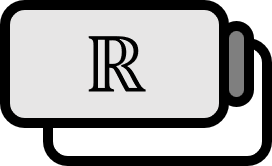Radius of Convergence of Power Series
Summary1
For the given power series $\sum\limits_{n=0}^{\infty} c_{n}(x - a)^{n}$, let $\alpha$ and $R$ be defined as follows.
$$ \alpha = \limsup\limits_{n \to \infty} \sqrt[n]{|c_{n}|}, \qquad R = \dfrac{1}{\alpha} $$
Then the series converges if $\left| x - a \right| \lt R$, and diverges if $\left| x - a \right| \gt R$.
- If $\alpha = 0$, let $R = \infty$, and if $\alpha = \infty$, let $R = 0$.
Definition
According to the theorem above, $R$ is called the radius of convergence of the power series $\sum\limits_{n=0}^{\infty} c_{n}(x - a)^{n}$.
Explanation
From the proof below, we can see that the power series $\sum\limits_{} c_{n} (x - a)^{n}$ with the radius of convergence $R$ absolutely converges on the open interval $(a - R, a + R)$.
Proof
Since $a_{n} = c_{n} (x - a)^{n}$, applying the root test here,
$$ \limsup\limits_{n \to \infty} \sqrt[n]{|a_{n}|} = \limsup\limits_{n \to \infty} \sqrt[n]{|c_{n}| \left| x - a \right|^{n}} = \limsup\limits_{n \to \infty} \sqrt[n]{|c_{n}|} \left| x - a \right| = \dfrac{\left| x - a \right|}{R} $$
By the root test, the series converges if $\dfrac{\left| x - a \right|}{R} \lt 1$, and diverges if $\dfrac{\left| x - a \right|}{R} \gt 1$.
■
Walter Rudin, Principles of Mathmatical Analysis (3rd Edition, 1976), p69 ↩︎
